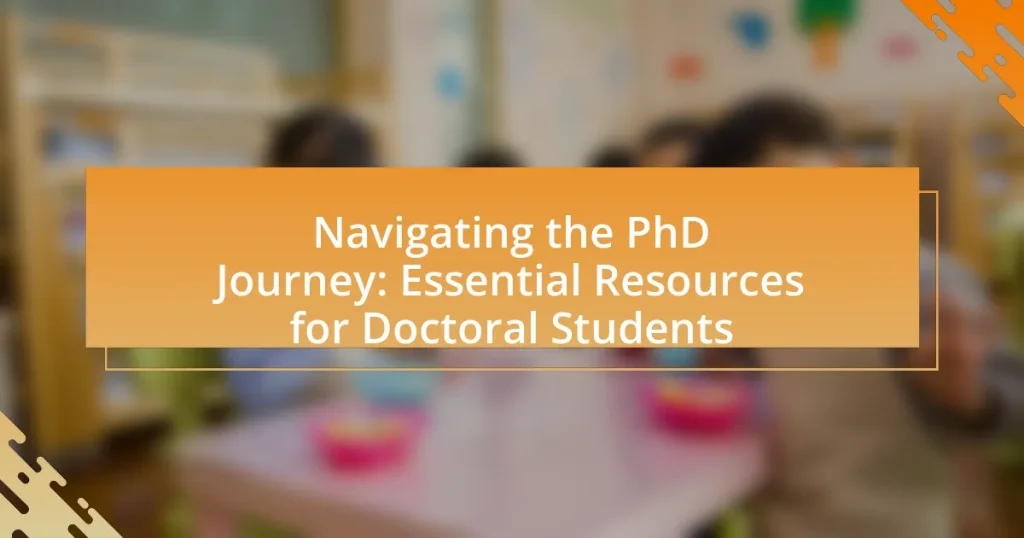The article “Navigating the PhD Journey: Essential Resources for Doctoral Students” focuses on the multifaceted process of pursuing a doctoral degree, emphasizing the importance of understanding the PhD journey, its key stages, and the resources available to students. It outlines how effective navigation can enhance academic success and well-being, detailing stages such as coursework, comprehensive exams, dissertation proposal, research, and defense. The article also highlights the significance of mentorship, academic advising, and various support systems, while providing practical tips for overcoming common challenges and maximizing resource utilization throughout the doctoral experience.

What does it mean to navigate the PhD journey?
Navigating the PhD journey means managing the complex process of pursuing a doctoral degree, which includes coursework, research, and dissertation writing. This journey requires students to develop skills in time management, critical thinking, and self-directed learning while also seeking guidance from advisors and peers. Research indicates that effective navigation of this journey can significantly impact a student’s success and well-being, as evidenced by studies showing that structured support systems improve completion rates and reduce stress among doctoral candidates.
How can understanding the PhD journey benefit doctoral students?
Understanding the PhD journey benefits doctoral students by providing clarity on expectations, timelines, and challenges they will face. This comprehension allows students to effectively plan their research, manage their time, and seek appropriate support, which can lead to higher completion rates. Research indicates that students who are well-informed about the PhD process are more likely to develop effective coping strategies and maintain motivation, ultimately enhancing their academic performance and well-being.
What are the key stages of the PhD journey?
The key stages of the PhD journey include coursework, comprehensive exams, dissertation proposal, research, dissertation writing, and defense. During coursework, students acquire foundational knowledge and skills relevant to their field. Comprehensive exams assess students’ understanding of their discipline and readiness to conduct independent research. The dissertation proposal stage involves presenting a research plan to a committee for approval. Research is the core phase where students conduct original investigations. Dissertation writing follows, where students compile their findings into a formal document. Finally, the defense is an oral examination where students present their work and respond to questions from a committee. Each stage is critical for progressing toward the completion of the PhD program.
How does each stage impact a student’s experience?
Each stage of the PhD journey significantly impacts a student’s experience by shaping their academic, emotional, and professional development. The initial stage, coursework, provides foundational knowledge and research skills, fostering critical thinking and discipline-specific expertise. In the proposal stage, students refine their research questions and methodologies, which enhances their confidence and clarity in their academic pursuits. The research stage is pivotal, as it involves hands-on investigation, leading to personal growth and resilience through challenges. Finally, the dissertation stage culminates in the synthesis of their work, impacting their sense of accomplishment and readiness for future career opportunities. Each stage is interconnected, contributing to a comprehensive educational experience that prepares students for both academic and professional success.
Why is it important to have resources during the PhD journey?
Having resources during the PhD journey is crucial for academic success and personal well-being. Resources such as access to research materials, mentorship, and financial support enable students to conduct thorough investigations, receive guidance, and alleviate financial burdens. Studies indicate that PhD students with adequate resources are more likely to complete their programs on time and achieve higher levels of satisfaction in their academic experience. For instance, a survey by the Council of Graduate Schools found that 75% of students who utilized institutional resources reported a positive impact on their research productivity and overall experience.
What types of resources are available for doctoral students?
Doctoral students have access to various resources, including academic support services, funding opportunities, research databases, and professional development programs. Academic support services often include writing centers, tutoring, and mentorship programs that help students refine their research and writing skills. Funding opportunities can come in the form of grants, scholarships, and assistantships, which are crucial for financing their studies. Research databases provide access to a wealth of scholarly articles and publications necessary for conducting thorough literature reviews. Professional development programs, such as workshops and networking events, equip doctoral students with essential skills for their future careers. These resources collectively enhance the academic experience and support the successful completion of doctoral programs.
How can these resources enhance academic success?
These resources enhance academic success by providing essential support, guidance, and tools tailored for doctoral students. Access to academic writing workshops, mentorship programs, and research databases equips students with the skills needed to produce high-quality research and navigate complex academic environments. For instance, studies show that mentorship can significantly improve doctoral completion rates, with a report from the Council of Graduate Schools indicating that students with mentors are 20% more likely to finish their degrees on time. Additionally, utilizing research databases allows students to access a wealth of scholarly articles, which can improve the quality of their literature reviews and overall research output.

What essential resources should doctoral students consider?
Doctoral students should consider academic journals, research databases, mentorship programs, writing centers, and professional organizations as essential resources. Academic journals provide access to the latest research and developments in their field, while research databases like JSTOR and PubMed offer extensive collections of scholarly articles. Mentorship programs connect students with experienced professionals who can provide guidance and support throughout their studies. Writing centers assist with developing writing skills, which are crucial for dissertation and publication success. Professional organizations, such as the American Psychological Association or the Modern Language Association, offer networking opportunities, conferences, and additional resources tailored to specific disciplines. These resources collectively enhance the doctoral experience and contribute to academic success.
How can academic advisors assist in the PhD journey?
Academic advisors assist in the PhD journey by providing guidance on research direction, academic requirements, and professional development. They help students identify suitable research topics, navigate coursework, and understand program expectations. Additionally, academic advisors offer support in developing skills such as grant writing and networking, which are crucial for career advancement. Their expertise can significantly enhance a student’s ability to successfully complete their dissertation and prepare for postdoctoral opportunities.
What role do academic advisors play in shaping research direction?
Academic advisors play a crucial role in shaping research direction by providing guidance, expertise, and resources tailored to a student’s academic and research interests. They help students identify viable research topics, refine research questions, and develop methodologies, ensuring alignment with academic standards and institutional goals. Advisors also facilitate access to funding opportunities, relevant literature, and networking within the academic community, which can significantly influence the trajectory of a student’s research. Their mentorship is essential in navigating challenges and fostering critical thinking, ultimately shaping the quality and impact of the research conducted by doctoral students.
How can students effectively communicate with their advisors?
Students can effectively communicate with their advisors by being clear, concise, and prepared for discussions. Clear communication involves articulating specific questions or concerns, which helps advisors provide targeted guidance. Conciseness ensures that the conversation remains focused and productive, while preparation includes gathering relevant materials or data beforehand to facilitate informed discussions. Research indicates that students who actively engage in regular meetings and follow up on action items tend to have more successful advisor relationships, as highlighted in the study “The Role of Advisor-Student Relationships in Graduate Education” published in the Journal of Higher Education.
What online platforms and tools are beneficial for PhD students?
Online platforms and tools beneficial for PhD students include reference management software, academic networking sites, and collaborative research tools. Tools like Zotero and Mendeley assist in organizing and citing research materials efficiently, which is crucial for managing extensive bibliographies. Academic networking platforms such as ResearchGate and Academia.edu facilitate collaboration and knowledge sharing among researchers, enhancing visibility and engagement within the academic community. Additionally, collaborative tools like Google Scholar and Overleaf support joint writing and data analysis, streamlining the research process. These platforms collectively enhance productivity, organization, and collaboration, which are essential for successful PhD completion.
Which online databases are crucial for research?
Crucial online databases for research include PubMed, JSTOR, Scopus, Web of Science, and Google Scholar. PubMed provides access to a vast repository of biomedical literature, with over 30 million citations, making it essential for health-related research. JSTOR offers a wide range of academic journals across various disciplines, facilitating access to historical and contemporary scholarly articles. Scopus and Web of Science are comprehensive citation databases that index peer-reviewed literature, enabling researchers to track citations and analyze research trends. Google Scholar serves as a freely accessible search engine for scholarly articles, providing a broad overview of available research across multiple fields. These databases collectively support rigorous academic research by offering extensive resources and citation tracking capabilities.
How can project management tools aid in organizing research tasks?
Project management tools aid in organizing research tasks by providing structured frameworks for planning, tracking, and collaborating on projects. These tools enable researchers to break down complex tasks into manageable components, assign responsibilities, set deadlines, and monitor progress in real-time. For instance, platforms like Trello and Asana allow users to create boards and lists that visually represent the stages of research, facilitating better task management and prioritization. Research conducted by the Project Management Institute indicates that organizations using project management practices see a 28% increase in project success rates, underscoring the effectiveness of these tools in enhancing organization and efficiency in research activities.

How can doctoral students effectively utilize their resources?
Doctoral students can effectively utilize their resources by strategically leveraging academic networks, institutional support services, and research tools. Academic networks, including faculty advisors and peer groups, provide mentorship and collaboration opportunities that enhance research quality and academic growth. Institutional support services, such as libraries and writing centers, offer access to essential materials and guidance that streamline the research process. Research tools, including databases and software for data analysis, enable efficient data management and analysis, which are critical for producing high-quality dissertations. Studies show that students who actively engage with these resources tend to complete their programs more successfully and with higher satisfaction rates.
What strategies can enhance the use of available resources?
Effective strategies to enhance the use of available resources include prioritizing time management, leveraging academic networks, and utilizing institutional support services. Time management allows doctoral students to allocate specific periods for research, coursework, and personal development, which increases productivity and resource utilization. Academic networks, such as collaborations with peers and faculty, provide access to shared knowledge and resources, fostering a supportive environment that enhances learning. Institutional support services, including libraries, writing centers, and counseling, offer essential tools and guidance that can significantly improve the doctoral experience. Research indicates that students who actively engage with these resources tend to have higher completion rates and better academic performance, underscoring the importance of strategic resource utilization in the PhD journey.
How can networking with peers improve resource utilization?
Networking with peers can significantly improve resource utilization by facilitating the sharing of knowledge, skills, and opportunities. When doctoral students connect with each other, they can exchange valuable insights about research methodologies, funding sources, and academic resources, which enhances their ability to access and utilize available resources effectively. For instance, a study published in the Journal of Higher Education found that collaborative networks among graduate students led to a 30% increase in resource sharing, including access to research tools and academic literature. This collaborative approach not only maximizes the use of existing resources but also fosters a supportive environment that encourages innovation and efficiency in research activities.
What are the best practices for seeking mentorship?
The best practices for seeking mentorship include identifying specific goals, researching potential mentors, and establishing a clear communication plan. First, doctoral students should define their academic and professional objectives to find mentors who align with those goals. Researching potential mentors involves looking into their expertise, publication history, and mentoring style to ensure compatibility. Establishing a clear communication plan entails reaching out with a concise introduction, expressing interest in their work, and outlining what the student hopes to gain from the mentorship. These practices enhance the likelihood of forming a productive mentoring relationship, as supported by studies indicating that well-defined goals and effective communication significantly improve mentorship outcomes.
What common challenges do doctoral students face in resource navigation?
Doctoral students commonly face challenges in resource navigation, including limited access to funding, inadequate mentorship, and difficulty in locating relevant academic resources. Limited funding often restricts students’ ability to attend conferences or access necessary materials, which can hinder their research progress. Inadequate mentorship can lead to confusion about available resources and how to effectively utilize them, impacting students’ academic development. Additionally, the vast array of academic resources can be overwhelming, making it challenging for students to identify and access the most pertinent information for their research.
How can students overcome obstacles in accessing resources?
Students can overcome obstacles in accessing resources by utilizing university support services, engaging with faculty, and leveraging online platforms. University libraries often provide workshops and training sessions that teach students how to effectively locate and utilize academic resources. Engaging with faculty members can also provide insights into specific resources relevant to their research, as professors typically have extensive knowledge of available materials. Additionally, online platforms such as academic databases and digital libraries offer a wealth of information that can be accessed remotely, making it easier for students to find necessary resources regardless of their physical location.
What support systems can help mitigate these challenges?
Support systems that can help mitigate challenges faced by doctoral students include academic advising, peer support groups, mental health services, and professional development workshops. Academic advising provides personalized guidance on research and coursework, which can alleviate confusion and stress. Peer support groups foster a sense of community and shared experience, allowing students to discuss challenges and solutions collaboratively. Mental health services offer essential resources for managing stress and anxiety, which are common during the PhD journey. Professional development workshops equip students with skills necessary for career advancement, enhancing their confidence and preparedness for post-PhD opportunities. These support systems collectively address the multifaceted challenges of doctoral studies, promoting resilience and success.
What practical tips can help doctoral students succeed in their journey?
Doctoral students can succeed in their journey by establishing a structured schedule, seeking mentorship, and actively engaging in academic communities. A structured schedule helps manage time effectively, allowing students to balance research, coursework, and personal commitments. Research indicates that time management is crucial for academic success, as it reduces stress and enhances productivity. Seeking mentorship provides guidance and support, which has been shown to improve completion rates in doctoral programs. Engaging in academic communities fosters collaboration and networking, essential for professional development and opportunities. Studies have demonstrated that students who participate in academic networks are more likely to publish and secure positions post-graduation.



